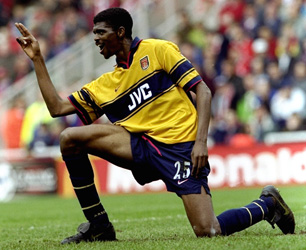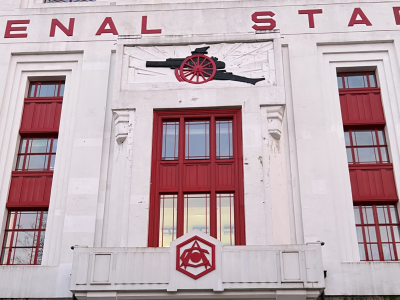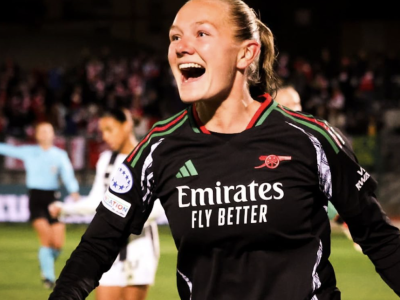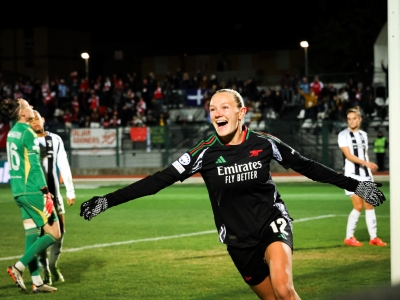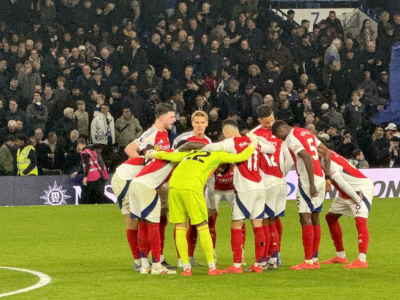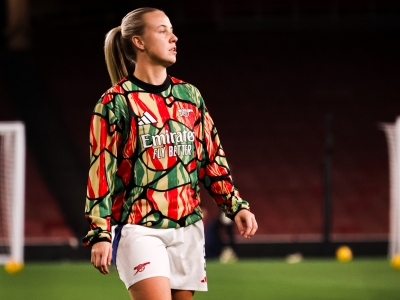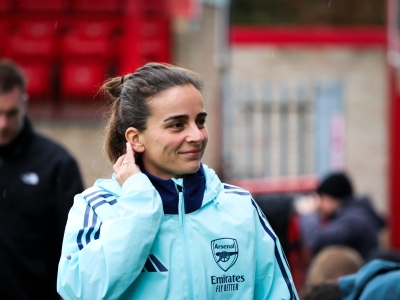(Part One covering up to 1966 can be found here and Part Two is covering 1966 to 1992 can be found here)
Middlesbrough were the only team from the North East who were founder members of the Premiership. The first Premiership meeting between the two teams occurred a week before Christmas 1992. For those who like to eulogise the George Graham era, it’s easy to forget that the Gunners were having a torrid time of it in the League at this point. After a run of six straight wins, following a 3-0 win over Coventry City, Arsenal topped the Premiership table and were favourites to become its inaugural Champions. There then followed four straight defeats against reigning Champions Leeds United, Man United, Southampton and Spurs which led to the Gunners sinking to eighth place. Middlesbrough meanwhile were twelfth.
Arsenal’s misery furthered when Paul Wilkinson gave Boro the lead eleven minutes from half time with a defensive calamity not usually associated with GG’s Arsenal. Arsenal however secured their first point in six weeks with an Ian Wright equaliser nine minutes from time to secure a 1-1 draw in front of just 23,197 fans. The winless run however continued for a further three games before finally beating Man City at Maine Road in Mid-January. By the time Arsenal headed to Ayresome Park to play Boro away, the Gunners had now languished in eleventh place. Their poor league form however countered by the fact that forty eight hours prior, Arsenal beat Spurs at Wembley in the Semi Final of the FA Cup and were awaiting another Wembley final twelve days later in the League Cup.
Middlesbrough in contrast were anchored to the foot of the table and four points adrift of safety. A crowd of 12,726 saw a 0-1 defeat for Arsenal, with John Hendrie on the scoresheet to move Boro off the bottom of the table. It wasn’t enough to save Boro however, who finished second from bottom. Arsenal in contrast finished the inaugural Premiership season in tenth place, though became the first side to win both domestic Cups in one season. While Boro returned to the Football League after one season, the decision had been made by Boro chairman Steve Gibson to leave Ayresome Park and relocate to the brand new Cellnet Riverside Stadium.
Boro finished their first season back in the second tier in ninth place, which led to the exit of former Charlton boss Lennie Lawrence and saw the appointment of Bryan Robson having just exited Man United after captaining them to the Double. In Robson’s first season, Boro were promoted back up to the Premiership as League Champions. Their victorious season also coincided with their final term at Ayresome Park. Steve Gibson also allowed Bryan Robson to splash out on Tottenham’s Nick Barmby. Their first game back in the Premiership was also the start of a new era for Arsenal, as it was the dawn of the Bruce Rioch era and debuts for new signings Dennis Bergkamp and David Platt.
Nick Barmby gave Boro the lead on the half hour. Five minutes later, Ian Wright equalised for Arsenal. The brave new era ended in an underwhelming 1-1 draw. By October, Middlesbrough managed to persuade Juninho to choose Teeside over Highbury. By the time of Arsenal’s first visit to the Riverside Stadium in Mid-January 1996, Arsenal had won just one game out of their previous six and now had dropped to sixth place in the Premiership table. Middlesbrough stood a point behind in eighth. Paul Merson gave Arsenal the lead on six minutes, though Juninho equalised for Boro. Ten minutes into the second half, Phil Stamp put Boro ahead. Four minutes later, David Platt pulled the Gunners level and just past the hour Glenn Helder put Arsenal back into the lead. With no further scoring Arsenal ran out 3-2 winners.
Boro finished their first season at the Riverside and back in the Premiership, in twelfth place. In the aftermath of Euro ’96, Boro shocked the football world by signing star of Serie A (then pretty much the epicentre of European Football) Fabrizio Ravanelli from reigning European Champions Juventus – who was even the highest paid player in the Premiership at the time. On his debut the ‘White Feather’ bagged a hat-trick in a 3-3 home draw with Liverpool. Arsenal’s first visit to the Riverside for the 1996/97 season came in late September. Six games into the season, both Boro and Arsenal had identical records of three wins, two draws and one defeat. Boro meanwhile were one place ahead of Arsenal in sixth place.
Arsenal meanwhile had sacked Bruce Rioch and had Stewart Houston briefly in charge as caretaker manager until he walked out to take over at QPR. While awaiting Arsene Wenger’s contract to expire in Japan, the Gunners had Pat Rice in charge as Caretaeker boss. Goals for John Hartson and Ian Wright gave Arsenal a 2-0 win, which moved the Gunners up to third in the table. Boro however hit crisis by the end of 1996 and had failed to fulfil a fixture with Blackburn Rovers, which the club put down to being struck by a flu virus. Boro came to Highbury on New Years’ Day 1997 to face Arsenal, in eighteenth place. The Gunners in contrast stood in third place, five points behind leaders Liverpool with a game in hand.
Arsenal took the lead with a superb volley from Dennis Bergkamp on the quarter hour. Just ahead of half time, Ian Wright doubled Arsenal’s lead. With no further scoring in the second half, Arsenal ran out 2-0 winners. The game was also notable as Bryan Robson’s final on pitch appearance just ten days short of his fortieth birthday (which seems incredible given his injury record!). The postponed fixture also hit Boro hard with the FA imposing a three point deduction against them as punishment. As the 1996/97 season came to the business end, Boro found themselves on dual carriageway to Wembley in both domestic Cup competitions, as well as a relegation battle.
Boro reached the League Cup final against Martin O’Neill’s Leicester City. This would be the first League Cup final since 1983 not to be shown on terrestrial television and the very first to feature on Sky Sports. In extra time, Fabrizio Ravanelli put Boro ahead in extra time, before an Emile Heskey equaliser for the Foxes meant a 1-1 draw and the first replayed League Cup Final for sixteen years. The game was replayed at Hillsborough and a goal for Steve Claridge meant a 0-1 defeat for Boro. In the FA Cup, Boro reached the Semi Final against third tier Chesterfield at Old Trafford. The underdogs shocked Boro after going two up on the hour mark with a penalty from current Burnley manager Sean Dyche.
Boro pulled it back to two each with goals from Fabrizio Ravanelli and a Craig Hignett penalty. Into extra time, a goal from Gianluca Festa put Boro ahead ten minutes into extra time, before Chesterfield equalised with a minute left to play for a 3-3 draw. An outlandish claim surrounding this game however came from rogue MI5 agent and Boro fan David Shayler. The spy had been on the run after tipping off the Guardian Newspaper of an MI6 plot to pay Al-Qaeda to murder Libyan despot Colonel Gadhafi back in 1996. He claims that the secret services had engineered behind the scenes to get Boro through to Wembley in order to entice Shayler out of hiding to attend the first Wembley visits in Boro’s history. Shayler made specific mention of a perfectly valid Chesterfield goal which was disallowed by the match day referee.
In the replay, Boro eased passed Chesterfield with a 3-0 win to face a Chelsea side who had not won a trophy for twenty six years. In the meantime, Boro faced a struggle to remain in the top flight. With a week left to go, Boro travelled to Old Trafford to play title chasing Man United, five points adrift of safety with just three games left to play. Bryan Robson’s side shocked Man United to take a 3-1 lead, before a rare goal for Gary Neville and an Ole Gunnar Solskjaer equalised pegged Boro back to a 3-3 draw. There followed a 0-0 draw away at Blackburn Rovers three days later to set up a D-Day Super Sunday on the last day away at Leeds United.
Brian Deane put Leeds United in front, before a Juninho equaliser. With no further scoring however, a 1-1 draw was not enough to prevent Boro facing the drop to the second tier, despite scoring as much as fifty one goals – thirty one of which came from Fabrizio Ravanelli alone. A demoralised Boro headed to Wembley to face Chelsea in the FA Cup Final. Boro were shocked by a Roberto Di Matteo shot after thirteen seconds, which gave Chelsea the lead (the fastest ever FA Cup Final goal). Another from Eddie Newton gave Chelsea a 2-0 win. Despite relegation, Boro kept faith with Bryan Robson as boss, though lost Fabrizio Ravanelli to Marseille.
The fightback however included a shock swoop for Arsenal’s Paul Merson, who transferred to Boro for £4.5million. It’s been pondered ever since whether Merse had a fall out with Wenger leading to his Arsenal exit. What Merse has said on the matter was that: ‘People thought I was mad to leave Arsenal for Boro, but they were mad to think it. I joined a club that wanted me, a club going places, it wasn't for the money, I actually took a pay cut to join them, it's not every day you have an opportunity to work with somebody like Bryan Robson, it was a no brainer’. Arsenal however replaced Merse with Marc Overmars, so it’s fair to say the blow was softened somewhat. Arsenal’s next meeting with Boro came the following season in the fourth round of the FA Cup at the Riverside Stadium in January 1998.
At the time, Arsenal were fifth and eleven points behind Premiership leaders. Boro however stood in second place and were pushing for promotion back to the Premiership. Merse’s replacement Marc Overmars put Arsenal ahead after two minutes. Ray Parlour added a second on nineteen minutes. Just past the hour mark, after Alex Manninger made a wild dash, from which Paul Merson made his point to Arsene Wenger. It wasn’t enough however to prevent a 2-1 win for Arsenal to progress to the fifth round, on route to the Double at the end of the 1997/98. Boro also progressed to the final of the League Cup for the second season in a row courtesy of a win over Liverpool in the Semi Final, to play Chelsea again.
Making his debut in the final would be Paul Gascoigne, signing from Rangers and making his first appearance in the English game since his last seven years prior, also in a Wembley final for Spurs in 1991. Boro however again crashed to a 0-2 defeat. Boro however came back up to the Premiership after one season as second tier runners up. Their first game back at Highbury on returning came at the end of November 1998. After fourteen games, Arsenal were fifth and five points behind leaders Aston Villa. Boro were two points behind Arsenal in seventh. Brian Deane gave Boro the lead after six minutes, however a last minute goal from Nicolas Anelka gave Arsenal a 1-1 draw.
The return fixture at the Riverside came the following April. At the time, Arsenal were one point behind Man United at the top of the table but having played one game extra. Boro meanwhile stood seventh. Title challenging Arsenal turned in a sublime performance. The scoring was kicked off with a Marc Overmars penalty after four minutes. Further goals for Anelka and Kanu put the Gunners three up by half time. By the hour mark a goal for Patrick Vieira and another from Kanu (a superb back-heeled contender for goal of the season) meant Arsenal were five up by the hour mark. With twelve minutes to go, another from Anelka made it six of the best. With three minutes to go, Alun Armstrong pulled one back for Boro, but couldn’t prevent a 6-1 hammering by Arsenal.
The result took Arsenal to the top of the table, after Man United were held to a 1-1 draw with Leeds United, though Alex Ferguson’s side still held a game in hand over the Gunners. The title race went to the wire, with Arsenal missing out on the title to Man United by one point. Boro meanwhile finished their first season back in ninth position – their highest finish since 1979/80. The next meeting between the two sides occurred the following November at Highbury. It would be a case of Dutch delight for the Gunners, as two for Dennis Bergkamp and a hat-trick for Marc Overmars meant a 5-1 win for Arsenal. Hamilton Ricard meanwhile was on target for Boro.
The final meeting between the two sides before the Millennium occurred ten days later in the League Cup. Arsene Wenger employed his policy of playing non-first teamers – the starting eleven included obscure names such as Tommy Black, Stefan Malz and Paolo Vernazza, as well as players soon to be first teamers but then on the fringes of things like Thierry Henry and Silvinho. There too were substitute debut appearances for Ashley Cole and Jermaine Pennant one month short of his seventeenth birthday. Hamilton Rickard gave Boro the lead on eight minutes, before a superb Thierry Henry equaliser with a twenty yard shot seven minutes before half time.
Davor Suker put Arsenal ahead with ten minutes to go, before Hamilton Ricard equalised from the penalty spot three minutes later to make it 2-2. The game went to extra time with no further scoring which meant a penalty shoot-out. Nelson Vivas, Matthew Upson and Silvinho all saw their penalties saved by Mark Schwarzer in the Boro goal, while successful conversions by German international and Euro ’96 winner Christian Ziege and Paul Gascoigne saw a 3-1 win for Boro on penalties. That same season, Arsenal would exit the FA Cup as well as lose the final of the UEFA Cup on penalties also.

